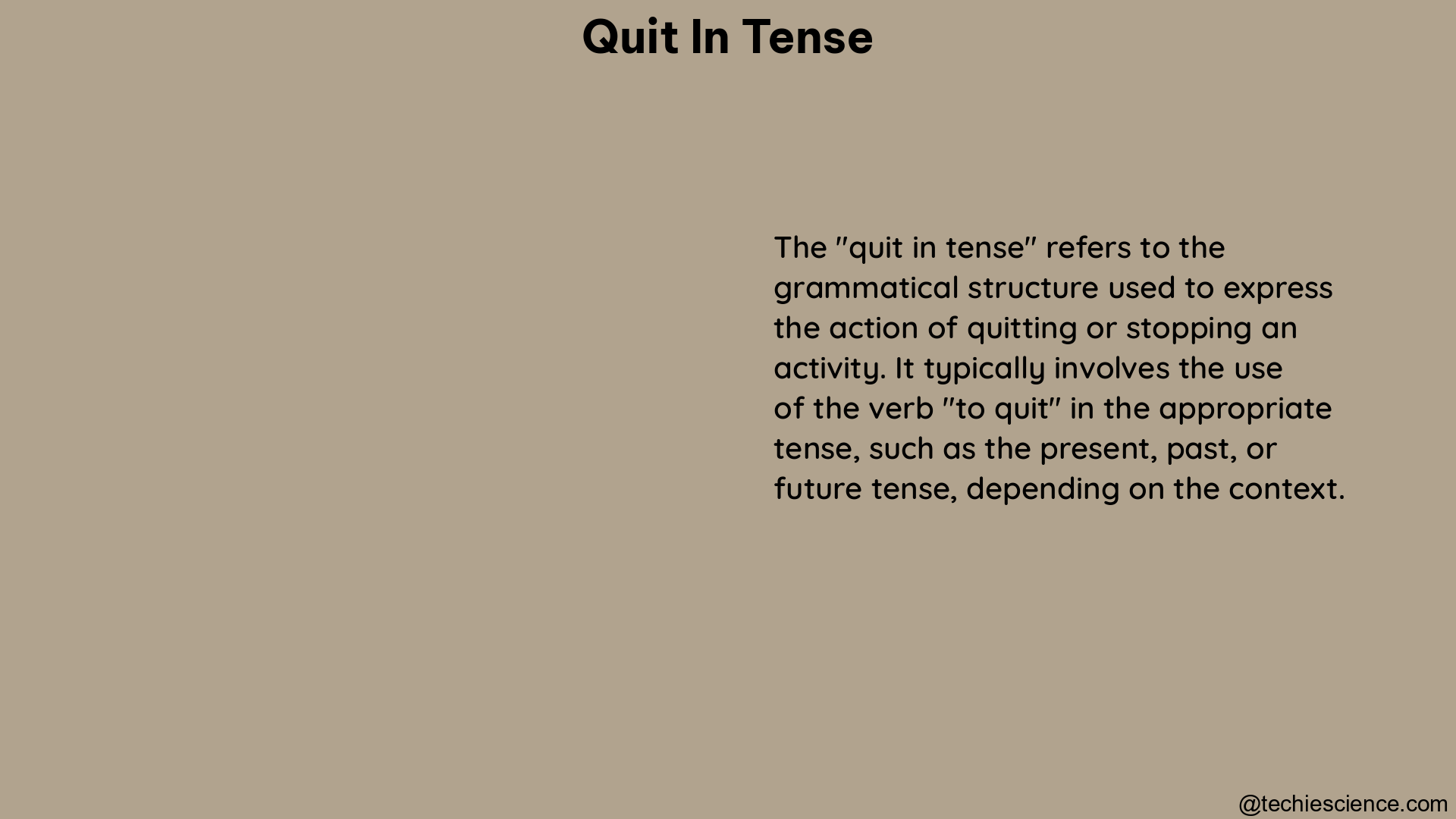The verb “quit” is a regular verb in English, and its conjugation follows standard patterns. This comprehensive guide will delve into the intricate details of using “quit” in various tenses, providing you with a thorough understanding of this essential verb.
The Present Tense of “Quit”
Simple Present
In the simple present tense, the conjugation of “quit” is as follows:
– I quit
– You quit
– He/She/It quits
– We quit
– You quit
– They quit
This tense is used to express habitual actions or general truths, such as “I quit my job every Friday” or “She quits when the work becomes too overwhelming.”
Present Continuous
The present continuous tense of “quit” is used to describe an ongoing action:
– I am quitting
– You are quitting
– He/She/It is quitting
– We are quitting
– You are quitting
– They are quitting
This tense is often used to express a current or temporary situation, like “I am quitting my job to pursue a new career path.”
Present Perfect
The present perfect tense of “quit” is used to describe an action that has been completed in the past but has relevance to the present:
– I have quitted or quit
– You have quitted or quit
– He/She/It has quitted or quit
– We have quitted or quit
– You have quitted or quit
– They have quitted or quit
For example, “I have quit my job and am now focusing on my personal projects.”
Present Perfect Continuous
The present perfect continuous tense of “quit” is used to describe an ongoing action that has been happening for some time and is still continuing:
– I have been quitting
– You have been quitting
– He/She/It has been quitting
– We have been quitting
– You have been quitting
– They have been quitting
This tense can be used to say, “I have been quitting my job for the past few months due to the stressful work environment.”
The Past Tense of “Quit”

Simple Past
The simple past tense of “quit” is used to describe an action that occurred in the past:
– I quitted or quit
– You quitted or quit
– He/She/It quitted or quit
– We quitted or quit
– You quitted or quit
– They quitted or quit
For instance, “I quit my job last year to start my own business.”
Past Continuous
The past continuous tense of “quit” is used to describe an ongoing action in the past:
– I was quitting
– You were quitting
– He/She/It was quitting
– We were quitting
– You were quitting
– They were quitting
This tense can be used to say, “I was quitting my job when the company announced the layoffs.”
Past Perfect
The past perfect tense of “quit” is used to describe an action that was completed before another past action:
– I had quitted or quit
– You had quitted or quit
– He/She/It had quitted or quit
– We had quitted or quit
– You had quitted or quit
– They had quitted or quit
For example, “I had quit my job before the company went out of business.”
Past Perfect Continuous
The past perfect continuous tense of “quit” is used to describe an ongoing action that was happening before another past action:
– I had been quitting
– You had been quitting
– He/She/It had been quitting
– We had been quitting
– You had been quitting
– They had been quitting
This tense can be used to say, “I had been quitting my job for several months before I finally made the decision to leave.”
The Future Tense of “Quit”
Simple Future
The simple future tense of “quit” is used to describe an action that will occur in the future:
– I will quit
– You will quit
– He/She/It will quit
– We will quit
– You will quit
– They will quit
For instance, “I will quit my job if they don’t improve the working conditions.”
Future Continuous
The future continuous tense of “quit” is used to describe an ongoing action that will be happening in the future:
– I will be quitting
– You will be quitting
– He/She/It will be quitting
– We will be quitting
– You will be quitting
– They will be quitting
This tense can be used to say, “I will be quitting my job next month to focus on my personal projects.”
Future Perfect
The future perfect tense of “quit” is used to describe an action that will be completed before another future action:
– I will have quitted or quit
– You will have quitted or quit
– He/She/It will have quitted or quit
– We will have quitted or quit
– You will have quitted or quit
– They will have quitted or quit
For example, “I will have quit my job by the time I start my new position.”
Future Perfect Continuous
The future perfect continuous tense of “quit” is used to describe an ongoing action that will be happening before another future action:
– I will have been quitting
– You will have been quitting
– He/She/It will have been quitting
– We will have been quitting
– You will have been quitting
– They will have been quitting
This tense can be used to say, “By the time I start my new job, I will have been quitting my current job for several months.”
Conditional and Subjunctive Forms of “Quit”
Conditional
The conditional form of “quit” is used to describe an action that would occur if certain conditions were met:
– I would quit
– You would quit
– He/She/It would quit
– We would quit
– You would quit
– They would quit
For instance, “I would quit my job if they didn’t pay me enough.”
Subjunctive
The subjunctive form of “quit” is used to express a hypothetical or imaginary situation:
– I quit
– You quit
– He/She/It quit
– We quit
– You quit
– They quit
This tense can be used to say, “The boss insisted that I quit my job immediately.”
Imperative Form of “Quit”
Present Imperative
The present imperative form of “quit” is used to give a direct command or instruction:
– (You) Quit!
– (We) Let’s quit!
– (You) Quit!
For example, “Quit your job if you’re not happy there!” or “Let’s quit this project and start a new one.”
Conclusion
By thoroughly understanding the various tenses and forms of the verb “quit,” you can effectively communicate your intentions, experiences, and hypothetical situations. This comprehensive guide has provided you with the necessary knowledge to master the usage of “quit” in the English language. Remember to practice using these tenses in your daily conversations and written communication to solidify your understanding and improve your overall language proficiency.
References
- https://en.bab.la/conjugation/english/quit
- https://www.wordreference.com/conj/enverbs.aspx?v=quit
- https://en.pons.com/verb-tables/english/quit
- https://www.collinsdictionary.com/us/conjugation/english/quit
- https://conjugator.reverso.net/conjugation-english-verb-quit.html

Hi…. I am Goutam Datta. I have completed a double M. A. in English and B. Ed. I am a creative writer. Currently, I am a part of the LambdaGeeks.